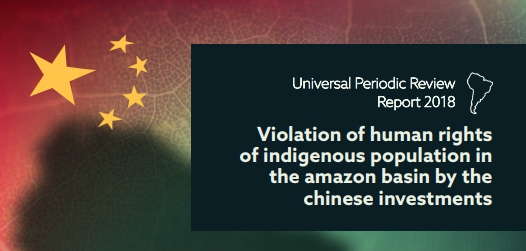Lima, Friday 14th June, 2019 .- Today , the United Nations High Commissioner for Human Rights has made public an official communication sent to the Chinese Ministry of Foreign Affairs to take into account requests made under the context of the Universal Periodic Review (UPR), to which the Asian country was subjected at the end of last year.
This communication mentions the need to apply the principle of extraterritoriality, which China must develop for its investments while respecting international socio-environmental commitments, and guarantee that companies operating in conflict zones perform due diligence on human rights, in accordance with the UN Guiding Principles on Business and Human Rights.
In Peru, projects like the Amazon Waterway – whose shareholder is the Chinese Company Synohidro – are being seriously challenged for breaching prior consultation agreements linked to the health , food security and access to drinking water in the project area’s 424 native communities, risks that were included in the due diligence of the company in charge of the project.
Similarly, Block 58 – located in Cusco’s Amazon area – was leased for exploitation to the China National Petroleum Corporation (CNPC), which has carried out the exploratory stage without implementing the Prior Consultation process with the indigenous peoples of the area, violating their collective rights and the national and international regulations that protect them.
This case -among others- was reported to the United Nations in the framework of the UPR by the Indigenous Coordinator of the Amazon Basin (COICA) 1 with the support of the Regional Coalition for Transparency and Participation, of which Law, Environment is part and Natural Resources (DAR) is member, including in its recommendations the respect for the principle of extraterritoriality.
Trade, companies and human rights
Currently, China has been expanding its commercial strategy in Latin America within the framework of its initiative One Road, One Belt, which implies a call for the strengthening of its international environmental and social safeguards, as it has been warned by groups such as the Regional Group on Financing and Infrastructure (GREFI). In the Peruvian case, the Memorandum of Understanding that formalizes the country’s integration to this initiative has been signed recently.
In this regard, it should be considered that Peru is elaborating the National Plan on Business and Human Rights, which should include the guiding principles on business and human rights and strengthen the due diligence of public and private entities.
In turn, it is necessary to strengthen the national regulations for the effective compliance with the rights of indigenous peoples. This transcends the negotiation stages of investment projects, where the Peruvian State presents the regulations for the business sector.
We consider of utmost importance that the Chinese State listens to the call of the United Nations and implements the UPR recommendations, especially in contexts of intensifying pressures on investment projects over indigenous territories. Chinese investments are among the most challenged in the Amazon Basin because of the ineffective and weak implementation of environmental and social standards in their development.
—
Footnote
1 The process of preparing the report was based on spaces such as the meetings of the Directive and Coordinating Councils of COICA and had the participation of national associations such as AIDESEP, ORPIA, OPIAC, CONFENIAE, COIAB, among others.
The report was presented before the UN Council, carrying out advocacy actions before diplomatic bodies from different UN member countries, both during the UPR Pre-Session and during the official sessions in Geneva – Switzerland, in October and November of 2018.
COICA representatives and collaborators of held meetings with diplomats from countries like Peru, Ecuador and Palestine, countries that gave recommendations for the Chinese government to assume its human rights obligations outside its borders, cited in paragraph 15 of the OHCHR report: «Compilation on China”.


